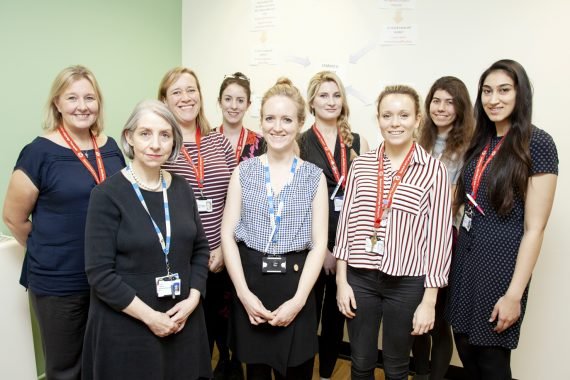- Are you interested in a dynamic career?
- Do you enjoy collaborating with others?
- Do you want to help people?
- Are you a Speech and Language Therapist looking to advance your career?

Find out more
Some Speech & Language Therapy (SLT) Facts
Have you ever wondered what it might be like to be lost for words or not able to effectively communicate? Nearly 20% of the population experience communication difficulties at some point in their lives. We eat and drink every day without thinking about it, however, when things go wrong with swallowing it can have a significant impact on someone’s health and wellbeing. Dysphagia is the term used to describe a swallowing disorder usually resulting from a neurological or physical impairment of the mouth, throat or oesophagus. Certain groups are more at risk of developing dysphagia. Research suggests that 50-75% of nursing home residents, 50-60% of head and neck cancer survivors and 40-78% of stroke survivors have dysphagia.
What does an SLT do?
Speech and Language Therapists (SLT) are Allied Health Professionals who provide assessment and treatment for children and adults who have difficulty with communication, cognition (thinking), eating, drinking and swallowing.
There are approximately 17,000 practising SLTs in the UK. At Addenbrooke’s Hospital, the SLT department is comprised of approximately 40 full time, part time and casual staff who use their unique skill sets to provide care for inpatients and outpatients throughout the hospital. SLTs have the opportunity to collaborate and work closely with professionals from various backgrounds, including Ear Nose and Throat specialists, Gastroenterologists, Respiratory Specialists, nursing staff, Occupational Therapists, Dietitians and many more!
In addition to clinical work, SLTs also provide teaching for multidisciplinary colleagues (e.g. Trust-wide “Be Disability Confident” training) and lead on projects to improve healthcare for people with communication and swallowing difficulties. For example, the rehabilitation SLT team were heavily involved in the inclusive hospital menu project, which was highly commended by the British Medical Association Patient Information Awards 2015.
Addenbrooke’s Hospital provides the opportunity to work across a range of different specialities and wards with some of the youngest patients (e.g. babies in intensive care) in the hospital through to some of the most elderly on the Department of Medicine for the Elderly wards. The teams you may be part of include:
- Adult Acute Speech and Language Therapy Team: SLTs working in the Adult Acute team work with a diverse range of patients with communication, cognitive and/or swallowing difficulties which may arise due to underlying medical conditions, post-surgery or acute illness. The Adult Acute SLT team work across various wards in the hospital, including Geriatric Medicine, Neurosurgery and Intensive Care to help patients achieve their swallowing and communication goals and provide advice. This may include modifying food and drinks to make them easier to swallow.
- Adult Ear, Nose and Throat/Head and Neck Team: The Head and Neck SLT service provides assessment, therapy and support for communication, voice and swallowing difficulties for all adults diagnosed with head and neck cancer and with non-cancerous voice problems. Patients are seen by the Head and Neck SLT team prior to and after their cancer treatment. The Head and Neck team can also deliver specialist training for both acute and community staff involved with laryngectomy care and voice problems.
- Adult Stroke and Rehabilitation Team: SLTs working in stroke and rehabilitation provide assessment, advice, support and therapy for patients and families after stroke, trauma and acquired brain injury to address communication, cognitive and swallowing difficulties. Working on the stroke and rehabilitation units involves collaborating with multidisciplinary colleagues including occupational therapy, neurologic music therapy, physiotherapy and psychology, to plan and implement therapy interventions to meet patients’ goals.
- Paediatric Speech and Language Therapy Team: Paediatric SLTs provide a specialist inpatient service for babies, children and young people up to the age of 16 across all of the paediatric acute wards at Addenbrooke’s Hospital, including the Paediatric Intensive Care Unit and Neonatal Intensive Care Unit. The Paediatric SLT team offer assessment, diagnosis and therapy interventions to children with speech, language and communication difficulties as well as eating, drinking and swallowing problems.
- The Communication Aid Service East of England (CASEE): The Communication Aid Service East of England (CASEE) works with adults and children all over the six counties of the East of England who meet the NHS England Specialised Services Criteria. This may include people with no or limited speech who require alternative communication methods such as computerised voice output communication aids. Members of the CASEE team go to see people in their homes, schools, residential settings and work alongside Community Allied Health Professionals and education professionals to support clients and their families with their use of AAC (Augmentative and Alternative Communication).
Your Learning and Development
We are able to offer training in specialised instrumental swallowing assessments using both x-ray (Videofluoroscopy Swallowing Study – VFSS) and Fibreoptic Endoscopic Evaluation of Swallowing (known as FEES) through formal competency training programs. These services are available for inpatients and outpatients as clinically indicated. Formal competencies in Surgical Voice Restoration are also offered via the Head and Neck SLT team.
We are passionate about investing in the futures of our staff. All members of the team are encouraged and supported to continually develop their skills, knowledge and experience within their area of specialist interest. This is offered through a combination of attendance at formal courses, self-directed learning, case discussion and clinical supervision.
Would you like to know more?
Contact the CUH Speech and Language Therapy Department on 01223 216 200
The following links may also be useful:

